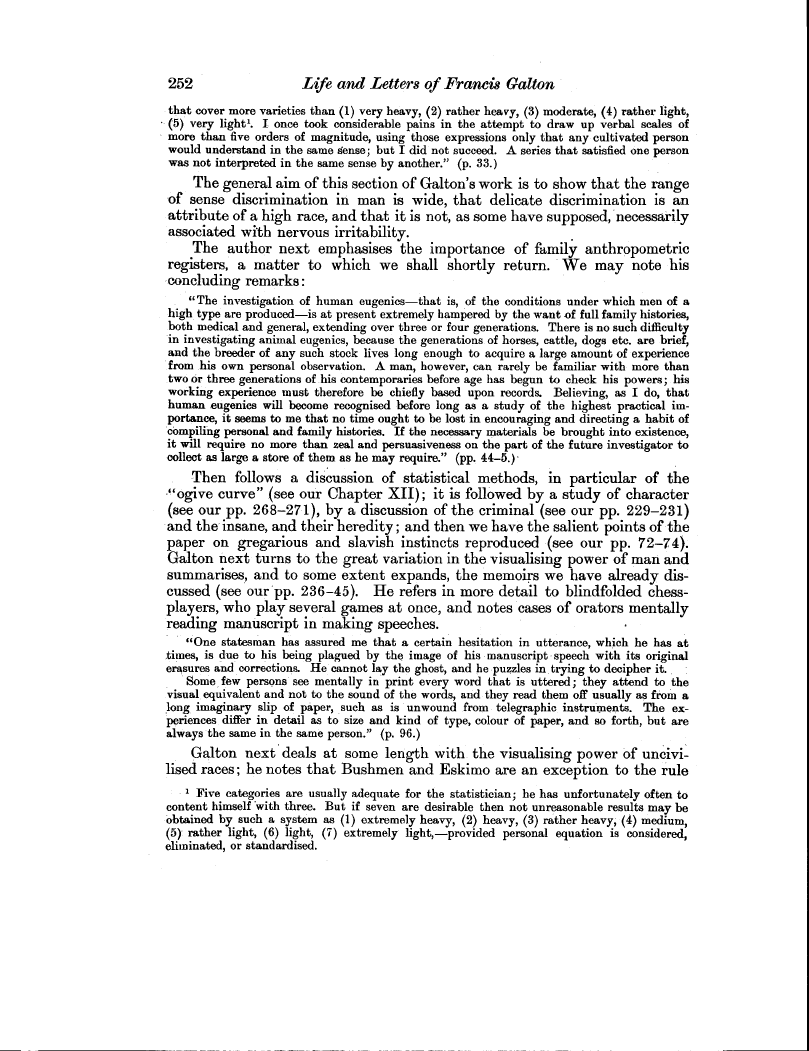252 Life and Letters of Francis Galton
that cover more varieties than (1) very heavy, (2) rather heavy, (3) moderate, (4) rather light, (5) very light'. I once took considerable pains in the attempt to draw up verbal scales of more than five orders of magnitude, using those expressions only that any cultivated person would understand in the same sense; but I did not succeed. A series that satisfied one person was not interpreted in the same sense by another." (p. 33.)
The general aim of this section of Galton's work is to show that the range of sense discrimination in man is wide, that delicate discrimination is an attribute of a high race, and that it is not, as some have supposed, necessarily associated with nervous irritability.
The author next emphasises the importance of family anthropometric registers, a matter to which we shall shortly return. We may note his concluding remarks
"The investigation of human eugenics-that is, of the conditions under which men of a high type are produced-is at present extremely hampered by the want of full family histories, both medical and general, extending over three or four generations. There is no such difficulty in investigating animal eugenics, because the generations of horses, cattle, dogs etc. are brief, and the breeder of any such stock lives long enough to acquire a large amount of experience from his own personal observation. A man, however, can rarely be familiar with more than two or three generations of. his contemporaries before age has begun to check his powers; his working experience must therefore be chiefly based upon records. Believing, as I do, that human eugenics will become recognised before long as a study of the highest practical importance, it seems to me that no time ought to be lost in encouraging and directing a habit of compiling personal and family histories. If the necessary materials be brought into existence, it will require no more than zeal and persuasiveness on the part of the future investigator to collect as large a store of them as he may require." (pp.. 44-5.)•
Then follows a discussion of statistical methods, in particular of the "ogive curve" (see our Chapter XII); it is followed by a study of character (see our pp. 268-271), by a discussion of the criminal (see our pp. 229-231) and the insane, and their heredity ; and then we have the salient points of the paper on gregarious and slavish instincts reproduced (see our pp. 72-74). Galton next turns to the great variation in the visualising power of man and summarises, and to some extent expands, the memoirs we have already discussed (see our' pp. 236-45). He refers in more detail to blindfolded chessplayers, who play several games at once, and notes cases of orators mentally reading manuscript in making speeches.
°'One statesman has assured me that a certain hesitation in utterance, which he has at times, is due to his being plagued by the image of his manuscript speech with its original erasures and corrections. He cannot lay the ghost, and he puzzles in trying to decipher it.,
Some few persons- see mentally in print every word that is uttered; they attend to the visual equivalent and not to the sound of the words, and they read them off usually as from a long imaginary slip of paper, such as is unwound from telegraphic instruments. The experiences differ in detail as to size and kind of type, colour of paper, and so forth, but are always the same in the same person." (p. 96.)
Galton next deals at some length with the visualising power of uncivilised races; he notes that Bushmen and Eskimo are an exception to the rule
' Five categories are usually adequate for the statistician; he has unfortunately often to content himself with three. But if seven are desirable then not unreasonable results may be obtained by such a system as (1) extremely heavy, (2) heavy, (3) rather heavy, (4) medium, (5)' rather light, (6) light, (7) extremely light,-provided personal equation is considered, eliminated, or standardised.

